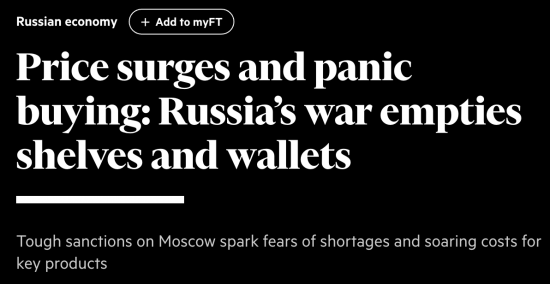The FT has this headline today:

The story is of shortages, inflation now running at 15% in a month for some items, and worse to come.
In response Putin is increasing wages and pensions - which he can, of course. Modern monetary theory explains how money is created in Russia as well as it does anywhere else.
Of course, creating money when there is nothing to buy solves nothing. Putin might be adding to his woes. That is not my great concern at this moment. The fact that this war is having, and is going to have knock-on effects on ordinary people worldwide, is my concern.
The inflation it is and will create will be reflected in grossly unwise interest rate increases, one of which was seen in the US yesterday. In this way, the impact of this war will be exported to the indebted developing world by increasing their debt burdens. That is grossly unfair. The impact on already indebted households will be as unfair.
Oil, gas and energy exploitation will, as I noted at the weekend, enrich a few, at cost to millions in the UK and millions across the world.
And food shortages are going to hit, soon. You cannot lose the wheat exports from Ukraine and Russia, which war means is going to happen, and not have an actual impact on wheat supply, let alone a significant increase in wheat prices.
Right now Russia is seeing the immediate economic impact of war. We will be seeing it soon. Added to the economic impacts of Covid and Brexit, the knock on effects of this war are going to be massive.
How massive? I am working on that. But for millions in this country the inflation in food, domestic energy and road fuel prices is going to create a breaking point where the economic equation becomes unsustainable. Quite literally ends will not be able to meet, whatever savings many will seek to find - which savings will also have massive knock on effects.
The FT is noting the impact of war on Russia. Over the next few days I will be looking at that same impact here. The story is profoundly grim, and there is as yet almost no sign that the government understands this. And that is the really worrying thing.
Thanks for reading this post.
You can share this post on social media of your choice by clicking these icons:
You can subscribe to this blog's daily email here.
And if you would like to support this blog you can, here:



This interview very recently with retired USA Colonel Douglas Macgregor touches on some of the points you are making about some likely affects of the war on the worlds economies but also, importantly, touches on many of the issues that are completely missing from the MSM.
https://youtu.be/NFngc_8RiVc
It seems that the economic intertwining of the modern world makes waging a ‘traditional’ war almost a fruitless exercise. What is to gain in all this?
How can it justified to the Russian people let alone to the rest of the world?
Interesting news just out
https://www.bbc.co.uk/news/business-60779001
Interesting to see what they say
I note that report on P&O seems curiously void of any mention of Brexit. Speaking of Brexit, many of the shortages and greater living expenses coming our way were due to be coming anyway as a consequence of Brexit, though not to the same degree admittedly. It’ll be interesting to see if Boris attempts to implement the remaining Brexit import controls in the near future (as opposed to later this/next year as planned) just so he can blame the consequences on the war. Politically it could prove very useful to him.
P&O’s behaviour is scandalous.
I don’t tell me that the Tories did not know it was going to happen because I bet they did.
On a day when the Government was talking about ‘good jobs and good health outcomes for BAME citizens.
Yeah……….right…………….
And as with every crisis which has gone before, the worst pain will fall on the poorest in our communities, while the rich become even better off. Imagine the scale of dividends and share buybacks that oil and gas companies are going to pay out to their shareholders (most of them outside the UK). Yet the government still refuses a windfall tax.